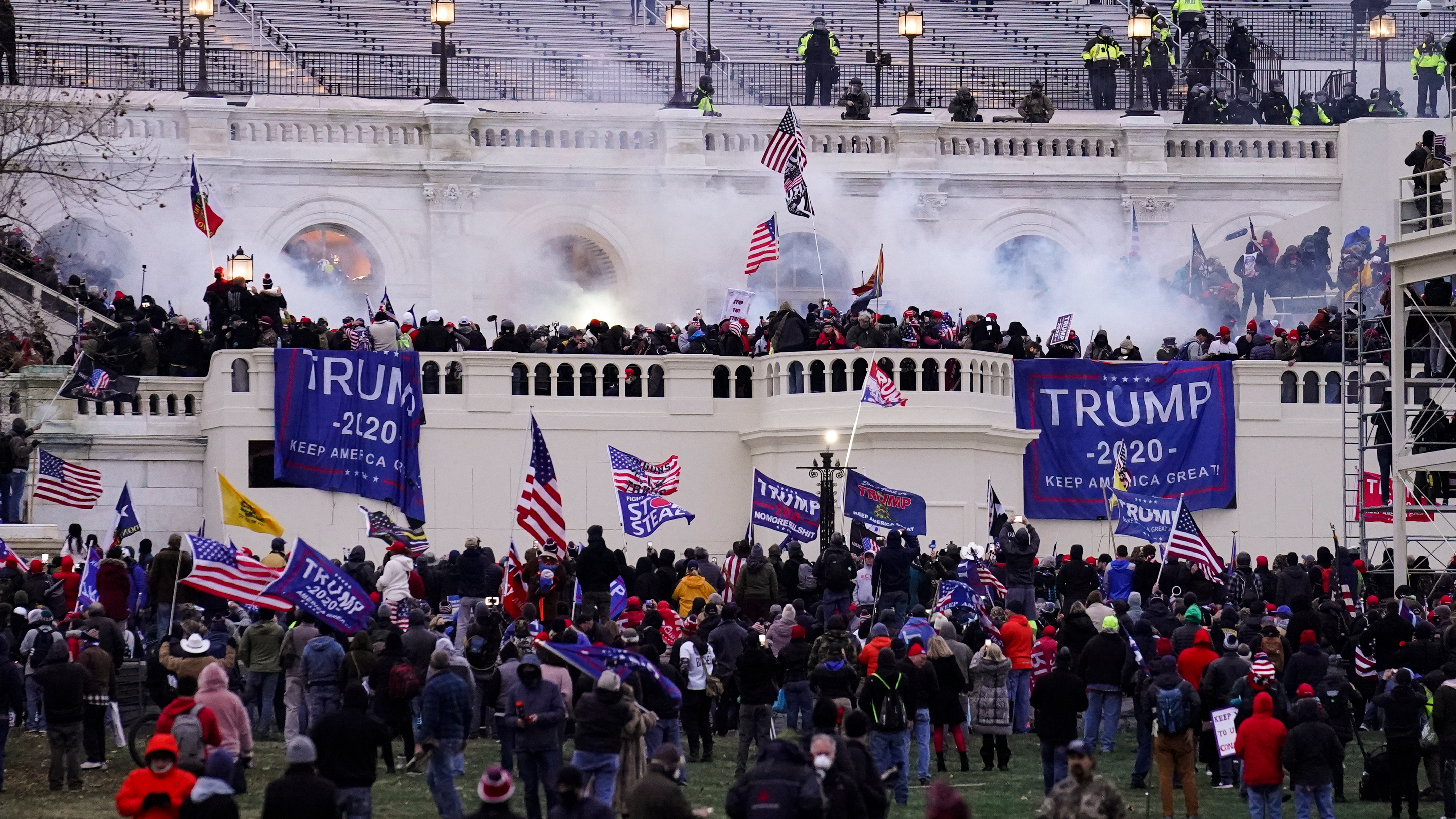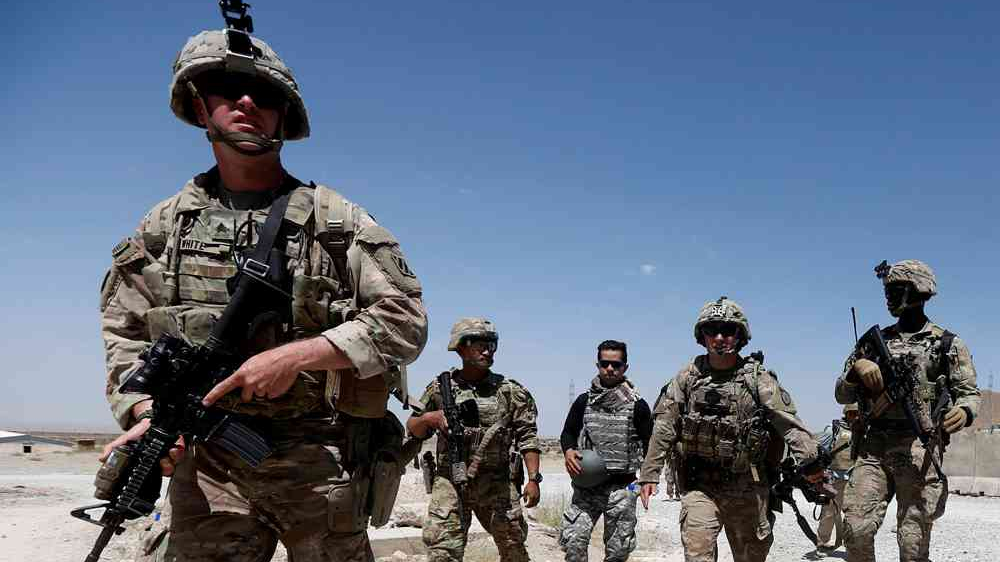
Violent protesters storm the U.S. Capitol, in Washington, D.C., January 6, 2021. /AP
Violent protesters storm the U.S. Capitol, in Washington, D.C., January 6, 2021. /AP
Editor's note: Charles C. Krulak, a retired four-star general, is a former commandant of the U.S. Marine Corps and former president of Birmingham-Southern College. The article reflects the author's opinions and not necessarily the views of CGTN.
Revelations that the insurrection at the U.S. Capitol included many former and current members of America's armed forces have been met with alarm. And yet, as a 35-year veteran and retired commandant of the U.S. Marine Corps, I saw the events of January 6 as the predictable culmination of a growing disconnect between the U.S. military and civilian society.
It is a rift with deep historical roots. When the United States emerged victorious from World War II, it had met a series of clearly articulated strategic goals. Whether or not they wore a uniform, Americans had been "all in," eagerly making the sacrifices necessary to defeat the Axis powers. When the war was over, U.S. servicemen and women returned to a country that was proud of what they had accomplished, united, and eager to move forward.
Once home, many veterans joined organizations like the Veterans of Foreign Wars and the American Legion, where they were surrounded by like-minded people who had served, suffered, and sacrificed together. Jobs were plentiful, and Americans took pride in their country and their military.
Similarly, in the Korean War less than a decade later, though America was never "all in," it nonetheless had clear strategic goals. As in WWII, U.S. servicemen and women did a remarkable job and came home to an appreciative country.
But then came Vietnam, where most Americans never really knew what their country was fighting for. When the conflict finally came to its ignominious end in April 1975, there was no victory to celebrate (and it certainly was not fireworks that flew from the roof of the U.S. embassy in Saigon). Unlike previous generations, those who fought in Vietnam were not honored for their service and sacrifice. Equally important, the public backlash against the war led to the end of military conscription, which fundamentally transformed the relationship between the military and the American people. The rift created by the shift to an all-volunteer military has grown wider ever since.
After Vietnam, America's next major war was Desert Storm in 1990. Again, clear strategic goals were met in a dramatic fashion, and U.S. servicemen and women returned to a proud country – on the cusp of becoming the world's only remaining superpower with the collapse of the Soviet Union the following year.
Yet by the end of the Gulf War, globalization and technological change had already begun to reshape American society.
Old-line industries were being upended, and many manufacturing jobs were disappearing. Although immigration had only a minor effect on the big economic picture, it became a hot-button political issue for those who found themselves out of work. At the same time, a new wave of social-justice issues also started gaining momentum during this period. As a microcosm of America, the U.S. military was not immune to these political dynamics.

U.S. troops patrol at an Afghan National Army Base in Logar province, Afghanistan, August 7, 2018. /VCG
U.S. troops patrol at an Afghan National Army Base in Logar province, Afghanistan, August 7, 2018. /VCG
It was against this political, social, and economic backdrop that America embarked on its "long war." Much like Vietnam, the "War on Terror" lacks clear strategic goals and has lost public buy-in over time. Many of those who have fought it subscribe to the apocryphal refrain that while the military was at war, America was at Walmart. After serving multiple tours in Iraq or Afghanistan, servicemen and women who sacrificed years of their lives have received little recognition.
In his 1973 book, The American Way of War, the historian Russell F. Weigley quoted U.S. General George C. Marshall as saying, "a democracy cannot fight a Seven Years' War," because any protracted conflict eventually will lose the support of the electorate. The longer a war runs – particularly when it becomes cross-generational – the greater the disconnect between the typical citizen and the soldiers, sailors, airmen, and marines who serve.
The War on Terror is an abiding case in point, helping to shed light on the unrest and extremism that burst into public view at the Capitol. A small minority of alienated former and active service members have concluded that something is wrong in the America for which they fought and sacrificed. The past two presidential elections have fueled this discontent and convinced some that they have a duty to confront perceived domestic "enemies." Political leaders, meanwhile, have exploited these sentiments for their own advantage.
The COVID-19 pandemic also contributed to a perfect storm. As the economy shed jobs – particularly at the lower end of the income distribution – face-to-face interactions were no longer possible. With deepening social atomization, it has become more difficult to experience solidarity. Angst or boredom have afflicted many, and some have found refuge in online communities espousing extremist ideologies. The 2020 presidential election brought the situation to a boiling point. A sitting commander-in-chief openly sought to overturn a free and fair election with lies and intimidation, and a small minority of his acolytes answered his call to action.
But Americans should have faith. Notwithstanding a few outliers, the U.S. military is unwavering in its support of, and dedication to, the U.S. Constitution. Those in its ranks who harbor extremist views will be discovered and dealt with appropriately. Looking ahead, recruitment methods will be strengthened to weed out extremists. Recruiters will have to look not only at candidates' social-media activity but also at their "body paint" (tattoos) and other potential indicators of extremist or racist sympathies. Interviews will need to be more pointed, and education for active members improved.
While the troubling trajectory of U.S. military-civil relations has created fertile ground for some members to be radicalized, it is important to remember that the insurrectionists represent an exception. The U.S. military has defended American democracy for centuries and will continue to do so, in keeping with our noblest traditions.
Copyright: Project Syndicate, 2021.
(If you want to contribute and have specific expertise, please contact us at opinions@cgtn.com.)

